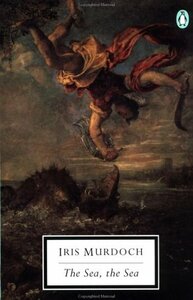Take a photo of a barcode or cover
A brilliant compelling book. Charles is the dark yin to James's bright yang. Charles is a sociopath, using people, completely egotistical and narcissistic. James is all self sacrificing and delightfully Dr. Strange mystical. I found myself wishing the book had been told from James's point of view but oh well. At one point James says to Charles that good actions can awaken evil results: "White magic is black magic. And a less than perfect meddling in the spiritual world can breed monsters for other people. Demons used for good can hang around and make mischief afterwards." All of the characters in this book are caught in a mandala of good and evil. They flip back and forth between good actions and bad actions and harmony and disharmony with each other and their environment. Most of the time, most of the characters are in disharmony and miserable. I can think of only set of characters who achieved perfect harmony -- Gilbert and Lizzie -- and only because they gave up seeking love and fleshly delights and lived together in perfect peace. James is in a perfect state of grace and Charles is in a perfect state of disgrace.
My first Iris Murdoch novel. Truly exquisite.
This was an Audible listen while I ran and commuted, and an actor’s read sometimes stands in the way of my own independent interpretation of a novel.
But here it enhanced it: Richard E Grant’s narration is the finest audiobook performance I’ve ever heard. Big statement but true story.
This was an Audible listen while I ran and commuted, and an actor’s read sometimes stands in the way of my own independent interpretation of a novel.
But here it enhanced it: Richard E Grant’s narration is the finest audiobook performance I’ve ever heard. Big statement but true story.
dark
emotional
mysterious
reflective
tense
slow-paced
Plot or Character Driven:
Character
Strong character development:
Complicated
Loveable characters:
No
Diverse cast of characters:
No
Flaws of characters a main focus:
Yes
There was a lot I loved about this book. Iris Murdoch is a great writer, with imaginative characters and a vivid way of describing things. I loved the detailed descriptions of different meals. Some elements of the book were a little unbelievable, which is why I haven't given it more stars. It was also longer than it needed to be and a little slow at the beginning.
A slow burn, enduring a protagonist who's soooo infuriating and self-absorbed but there's something about it that becomes v clever and life-affirming. Loved the descriptions of Shruff End (weather, food, atmosphere etc). Charmed by the postscript ending.
"Intellectually demanding" as david Twine said
"Intellectually demanding" as david Twine said
I was sure I'd read this in my late teenage Iris Murdoch phase, but now I'm sure I didn't because this story, these people, this book would be utterly unforgettable. It's weird, odd, almost spooky at times (that bead curtain made the hairs on the back of my neck stick up every time it was mentioned), and the narrator Charles Arrowby talks at length about himself and his various romances, often repeating himself, sometimes being thoroughly irritating, but by the end I adored him. Murdoch breaks quite a few writerly rules in The Sea, The Sea - several coincidences happen for example (which is supposedly a golden rule), but it works in the whole crazy story.
And the description of the sea - oh, so wonderful.
And the description of the sea - oh, so wonderful.
Only Iris Murdoch could make a conversation about attempted murder sound absurdly hilarious. I expected this to be more philosophical than it actually was. Nevertheless, what philosophical discussion there is (about happiness, life, and death) is nicely balanced with the plot and the characters. This was a delightful read in its absurdity and the way it portrays pain and obsession (and uses French clichés and some Shakespeare references thrown in for good measure). I cannot wait to read more of Murdoch's work.
I also greatly enjoyed John Burnside's introduction in this edition of the book. It gave me a much better understanding of the historical context (who knew that Britain in the 1970s was in the throngs of a celebrity-driven obsession with eastern mysticism) of this novel and a lens through which to view Charles's actions and obsessions.
I also greatly enjoyed John Burnside's introduction in this edition of the book. It gave me a much better understanding of the historical context (who knew that Britain in the 1970s was in the throngs of a celebrity-driven obsession with eastern mysticism) of this novel and a lens through which to view Charles's actions and obsessions.
I found this both repelling and compulsive, and the more repulsed I became the less capable I seemed of putting it down. I was hooked just several pages in, enamored with the elegant, elegiac tone of Charles Arrowby's attempts at composing a memoir/diary after exiling himself to a remote seaside home to live in monastic isolation. Via Arrowby, Murdoch's prose takes on a sea-like quality, the ebb-and-flow of memories and musings churning together present and past to the point where the edges of reality and unreality begin to blur imperceptibly. I settled in for what I fully expected to be more or less an intelligent and eerie psychological thriller.
But just as it was not meant for Arrowby to enjoy his solitude, so I was quickly jumbled out of any conceptions that I was in for a graceful memory piece. Suddenly figures from Arrowby's past begin showing up uninvited at his doorstep, culminating with the unexpected reappearance of a lost first love, setting off a string of increasingly erratic behavior that quickly threaten to become dangerous.
It took a while for me to adjust to such a drastic change of narrative trajectory, but as it went along I began to appreciate the grand guignol absurdity of it all. And it wasn't, I admit, until just about the very end that I realized how the incongruent-seeming opening does indeed set up nicely the rest of the novel: reported to be the premiere interpreter of Shakespeare of his day, isn't it natural, maybe even inevitable that Arrowby's life takes on an expansive Shakespearian theatricality?
"All the world's a stage,
And all the men and women merely players:
They have their exits and their entrances;
And one man in his time plays many parts,
His acts being seven ages."
-Shakespeare, [b:As You Like It|42607|As You Like It |William Shakespeare|http://ecx.images-amazon.com/images/I/51JQJj2mQJL._SL75_.jpg|702863]
And that kind of sums up my final response to The Sea, The Sea—creaky, isolated Shruff End is not the place of escape and seclusion Arrowby intends it to be, but is merely an empty stage upon which the figures of his past, present and possibly his future appear with a theatrical punctuality, reciting their lines, performing their small roles and disappearing again into the wings again until called upon again to reappear on cue around Arrowby as he plays his "many parts," from a wizened Prospero to a tragic Lear to a pathetically misguided attempt at Romeo and Juliet that quickly deteriorates into a truly horrific parody of Taming of the Shrew.
Did I enjoy The Sea, The Sea? I can't honestly say that I did. I'm not even sure that I liked it per se. But it did compel me to descend into a unique type of claustrophobic madness, creating a literary experience of a type that I've never quite experienced before, which is saying something indeed. My true reaction is suspended somewhere between three and four stars, but considering that the only other Murdoch novel I've read has continued to grow in stature in my memory, I gladly give the novel the benefit of the doubt and round my rating up.
The past and the present are so close, so almost one, as if time were an artificial teasing out of material which longs to join, to interpenetrate, and to become heavy and very small like some of those heavenly bodies scientists tell us of."
But just as it was not meant for Arrowby to enjoy his solitude, so I was quickly jumbled out of any conceptions that I was in for a graceful memory piece. Suddenly figures from Arrowby's past begin showing up uninvited at his doorstep, culminating with the unexpected reappearance of a lost first love, setting off a string of increasingly erratic behavior that quickly threaten to become dangerous.
It took a while for me to adjust to such a drastic change of narrative trajectory, but as it went along I began to appreciate the grand guignol absurdity of it all. And it wasn't, I admit, until just about the very end that I realized how the incongruent-seeming opening does indeed set up nicely the rest of the novel: reported to be the premiere interpreter of Shakespeare of his day, isn't it natural, maybe even inevitable that Arrowby's life takes on an expansive Shakespearian theatricality?
"All the world's a stage,
And all the men and women merely players:
They have their exits and their entrances;
And one man in his time plays many parts,
His acts being seven ages."
-Shakespeare, [b:As You Like It|42607|As You Like It |William Shakespeare|http://ecx.images-amazon.com/images/I/51JQJj2mQJL._SL75_.jpg|702863]
And that kind of sums up my final response to The Sea, The Sea—creaky, isolated Shruff End is not the place of escape and seclusion Arrowby intends it to be, but is merely an empty stage upon which the figures of his past, present and possibly his future appear with a theatrical punctuality, reciting their lines, performing their small roles and disappearing again into the wings again until called upon again to reappear on cue around Arrowby as he plays his "many parts," from a wizened Prospero to a tragic Lear to a pathetically misguided attempt at Romeo and Juliet that quickly deteriorates into a truly horrific parody of Taming of the Shrew.
Did I enjoy The Sea, The Sea? I can't honestly say that I did. I'm not even sure that I liked it per se. But it did compel me to descend into a unique type of claustrophobic madness, creating a literary experience of a type that I've never quite experienced before, which is saying something indeed. My true reaction is suspended somewhere between three and four stars, but considering that the only other Murdoch novel I've read has continued to grow in stature in my memory, I gladly give the novel the benefit of the doubt and round my rating up.
The past and the present are so close, so almost one, as if time were an artificial teasing out of material which longs to join, to interpenetrate, and to become heavy and very small like some of those heavenly bodies scientists tell us of."
3.5/5
It's taken me a while to come to much lauded book, and I think that, this time around, I'm not acting under any put upon assumptions of universal greatness. I'll also be honest and say Murdoch still attracts me for superficial reasons: her [b:The Green Knight|12819|The Green Knight|Iris Murdoch|https://i.gr-assets.com/images/S/compressed.photo.goodreads.com/books/1385190859l/12819._SY75_.jpg|1410480] sounds like a much more delicious twist on magical realism than this particular work contained in a very Orientalist form, and I find her GR profile to be exceedingly attractive—something about that jawline and that thousand yard stare appeals greatly. Other than that, I feel finished with this juncture of literature, as there's not enough time in the world to go after every person with an exceedingly long bibliography, and Murdoch is certainly no Woolf or Ishiguro. A difference in personal preferences, of course, but there were some nice scenes and turns of phrases in Arrowby's meanderings, and ultimately, I'm glad she's still being read and won enough prizes way back when to show up a few times on the 1001 BBYD citations. I just don't like my meaning interspersed between bouts of dramatic nonsense when so much else is going on in the world, and as always, I'll take the calm, meditative, even morose subtly over plot hysterics any day. All in all, another long awaited return that didn't go as well as I'd hoped, but at least I finally have some amount of closure.
But at the level of a vulgar curiosity they were at times a relief from the intensity of higher longings.It'd be easy to give this novel more credit than I honestly think it deserves. Such is the propensity of any mid 20th c. Anglo novel that is little more than a mix of soap opera, Shakespeare intimations, and the horrific backdrop of imperialism with all the sorts of UK citizens it spawns by sheer proximity if one thinks about it too much. Unlike [b:The Death of the Heart|91494|The Death of the Heart|Elizabeth Bowen|https://i.gr-assets.com/images/S/compressed.photo.goodreads.com/books/1497190244l/91494._SY75_.jpg|2225358], however, there's nothing revealing or profound about the misery of this cast of characters, which is why Bowen is in my future and Murdoch is in my past. Still, the latter's got a Booker Prize with this particular tome, and her literary reputation's well established enough a half century later that I don't feel the need to do much of my usual disinterring. Rather, I'm here because of an odd reading sojourn started around a decade ago by an epigraph to a chapter to a young adult fantasy novel, back when I used to collect such blips and devote myself to reading the works from which they hailed, one of which was Murdoch's [b:The Black Prince|120182|The Black Prince|Iris Murdoch|https://i.gr-assets.com/images/S/compressed.photo.goodreads.com/books/1422802904l/120182._SY75_.jpg|892836]. I don't think I knew enough then to figure out whether I actually liked that first work of hers or not, so here I am, six years later with a far more lauded tome of hers, figuring out what part of my long ago response was true resonance and what was brought about by the desperate need to fit in. In the end, my rating is the exact same as it was six years previous, so while I knew less back then, perhaps there was still something that led me on the right track.
How different each death is, and yet it leads us into the self-same country, that country which we inhabit so rarely, where we see the worthlessness of what we have long pursued and will so soon return to pursuing.My favorite parts of this were the ones concerning the cooking and fixing and otherwise day to day simultaneous living and domestic refurbishment of an old man seeking to retire and write his memoirs. Honestly, I probably could read about such for the 500+ pages this work ended up being if it were handled well. Unfortunately, what I got instead was a live action movie of a game of Clue, complete with (supposed) murder and all sorts of sensational nonsense that thrust the admittedly odious character out of any sort of contemplative state, resulting in my enjoying the beginning and a smidge of the end far more than I did the inebriated middle. I'm sure there's all sorts of arguments to be made about Prospero and Ariel and whatnot (it seemed a lot more like if Macbeth had survived his play and was made to live out in a nursing home surrounded by the rest of the cast, living and dead), but whatever meaning the book was driving towards wasn't the sort I tend to put value in extricating, and I'm rather allergic to any sort of plot that relies on random deaths to drive home profundity (see GoT, Walking Dead, any number of modern tragedy porn for this: Murdoch doesn't go nearly as far, but it still felt cheaply got). All in all, it would've been much more interesting if the self-absorbed narrator had been actually forced to go out and make new social connections of instead of having his whole rag tag fan club follow in his footsteps. Something something all the world's a stage and yadda yadda yadda, but I'm more interested in the slow, subtle, and sometimes terrifying limits confronted when one is faced with only oneself. Morbid, perhaps, but far less depressing then all the characters playing their androcentric, heteronormative roles so well that it's no wonder they're all miserable. Not only is no one getting any, they're not even willing to break out and experiment with the "any" itself.
It's taken me a while to come to much lauded book, and I think that, this time around, I'm not acting under any put upon assumptions of universal greatness. I'll also be honest and say Murdoch still attracts me for superficial reasons: her [b:The Green Knight|12819|The Green Knight|Iris Murdoch|https://i.gr-assets.com/images/S/compressed.photo.goodreads.com/books/1385190859l/12819._SY75_.jpg|1410480] sounds like a much more delicious twist on magical realism than this particular work contained in a very Orientalist form, and I find her GR profile to be exceedingly attractive—something about that jawline and that thousand yard stare appeals greatly. Other than that, I feel finished with this juncture of literature, as there's not enough time in the world to go after every person with an exceedingly long bibliography, and Murdoch is certainly no Woolf or Ishiguro. A difference in personal preferences, of course, but there were some nice scenes and turns of phrases in Arrowby's meanderings, and ultimately, I'm glad she's still being read and won enough prizes way back when to show up a few times on the 1001 BBYD citations. I just don't like my meaning interspersed between bouts of dramatic nonsense when so much else is going on in the world, and as always, I'll take the calm, meditative, even morose subtly over plot hysterics any day. All in all, another long awaited return that didn't go as well as I'd hoped, but at least I finally have some amount of closure.
Such a quick thoughtless destruction of the past must always be a matter of regret whatever the subsequent advantages.
finally, it is over. I wanted the beauty of the sea to seep in and redeem this but the suffocating pompousness of the narrator always got in the way. there was some relief when the supporting characters came in and affirmed the fact that Charles was a loose cannon and utter dingbat but unfortunately all I'm left with is the egoist thought that all my inner ramblings might be worth putting down. that is to say that it is easy to read and influential in a way, but what for?
dark
emotional
funny
tense
slow-paced
Plot or Character Driven:
Character



